#still considering if i should post about the potential magic specialties
Explore tagged Tumblr posts
Note
A while back you made a post about how wizards consciously choose what their specialty in the arcane us, whether that be abjuration, enchantment (ew), or as you professed in a later fallow-up post to be your favorite, illusion!
What I’m curious about, personally, is your thoughts on the school of Chronurgy, time magic? It’s such a fascinating concept, especially viewing it through the lens of memory and/or perception, and as someone playing a Chronurgy Wizard, I’m genuinely curious.
(Side note, if you’re looking for a darker read in the more modern look at time travel, I may just suggest Recursion by Blake Crouch.)
Okay, in terms of magical theory, this one is interesting and slightly sticky, in that it’s not, at least not yet, technically a school. The eight schools are definitions of types of magic, and literally all spells in 5e are divided among them. Dunamancy, while it is its own disciple with its own subdisciplines, still has its spells considered part of/emerging from other schools.
Now, for Doylist reasons, this is because Matt Mercer had to graft his wizard subclasses into the pre-existing system. But it is also interesting in a Watsonian sense, because it does bring back up the question of the limits of the eight schools and whether they are all there is to magic or not.
So, for the moment, Chronurgy and Graviturgy are considered more … disciplines than schools? Like Bladesinging or War Magic, they’re about exploring how magic interacts with or can be used for certain specific purposes, but they’re not considered part of the fundamental architecture of how magic is understood to work.
So the question becomes, then, whether they should be. If chronurgy spells should become their own school, or if they are provably extensions of other schools, and the question becomes the limits of the eight instead. Is chronurgy a combination of divination/necromancy magic, or should it be its own thing? If it is its own thing, what other spells might be pulled from other schools and considered chronurgy instead? What is the difference between, say, time magic and divination magic? Or time magic and conjuration magic? Would seeing the future be divination, travelling to it be conjuration, and pulling the future to the present be chronurgy? If you are pulling the future to the present to, for example, age someone a thousand years in a moment, what is the difference between that and necromancy? Is necromancy specifically when you are pulling death energy to harm people, and chronurgy when you are using time? But then what is the difference between death and mortality?
And that’s leaving aside the potentially divine origins of dunamancy. Is dunamancy just a more focused version of divine magic, and the dividing line is origin, not use or effect?
It's an interesting theoretical tangle, and you could easily have many in-universe characters with differing opinions on the matter.
That’s from the magical theory perspective. From the character perspective … Well. They can definitely have opinions on the matter as well. What do they consider the difference between what they do and, say, divination? Or do they consider there to be a difference, or are they happy to consider chronurgy a unifying disciple that is drawing from different schools, rather than being one in its own right? How do they define/conceptualise time, and how it interacts with magic, or magic with it?
Wizards are such fucking nerds. It’s fantastic.
17 notes
·
View notes
Text
Non-residents of Ruefell
In the wake of my productivity, I thought I'd make a post with information about MC's family! Apologies for any format issues. I'm still having to do this all on my phone. Minor spoilers ahead (as in "brought up at the beginning of chapter 1" minor)
Surname is customizable, so I'm not including one where there usually would be here. Also MC's relationships with all of these characters will be a choice, so I will only mention what they feel towards MC regardless of the relationship.
Jack: MC's eldest brother. At 35 years old, he seems to be destined for greatness, slated to inherit both the family business and now having been willed Grandfather's seat on The Council. He is a powerful witch, but it's a wonder how he stands up under all that pressure. It's a good thing he has his husband, Matthew, an Eadi but no less respectable man, to support him in his ambitions. He has no magic specialty due to his path in life.
He is cold on the surface, never seeming to break his mask of stoicism. It's something instilled in him by Mother and he'll never stop resenting her for making him what he is. He cares about MC, but it's such a struggle figuring out how to show it.
Louis: MC's older brother and the middle child. At 31 years old, he... has no ambitions in life. At least, nothing magic related, and to Mother, that's the same as having no ambitions. He's a construction worker, living alone and single in another city that he moved to as soon as MC went off to university. He has no desires to be a witch and rejected all his magic ability, refusing to use it to this day. This is why he also has no magic specialty.
He's a sweet, cool, and easy-going guy. No matter how MC feels for him, he cares about them and wants to show it. He's always been an easy person to confide in, and perhaps that personality made living at home all those years more bearable.
Mother: Lizbeth, MC's mother. At 65 years old, she is the head of the family business and expects... or, expected greatness from her children. Jack was her prize, despite his feelings towards her, Louis was a disappointment, and MC... well, she'll just have to see how they do with this new job of theirs. One of her specialties is Artificing, but that doesn't begin to encompass her power and intelligence.
She is even colder and more calculating than Jack. People are just numbers, feelings only get in the way of greatness. She didn't even bat an eye at the news of her father's death. And yet, she is accomplishing great things. She had hopes that at least 2/3 of her children would do the same and she's not too happy MC will be starting with a small shop in a countryside town.
Father: Sloan, MC's father. He was rarely home. An ambitious man even now at 63 years old, he worked with many business partners across the world and traveled frequently, returning home only every few months. His specialty is Electromancy and he has been working hard at getting power into everyday homes, particularly for the family business' inventions, and was one of two who pioneered the telephones that, though rare, now sit in many businesses' offices.
He is cold and frequently unimpressed almost like Mother, but only to those outside of the family. To his children, he is... awkward about feelings, to say the least, but he tried to be kind. He cares, but how much of that shows when he was never home anyhow?
Grandfather: Percy, MC's grandfather, on their mother's side. He was their last surviving grandparent until 2 years before their graduation from university, when he passed away. He was an eccentric and kind man, it'd almost be a wonder how he's related to the family, unless you knew his son-in-law seems to have followed in his footsteps of rarely showing his face to even his wife and children. There's only room for ambition in this family.
Still, he loved his grandchildren and wished great things for them, wherever their walks in life took them. Why he willed MC his little old shop back in Ruefell is a mystery, but once they've arrived, they'll soon realize that old man was not all he seemed to be and maybe there was a reason he wanted that shop to stay in the family, under MC's care specifically.
#magic of ruefell#ghosts in the gaslamp#information#family#MC's family#Jack#Louis#Mother#Father#Grandfather#MC also has a lot of aunts and uncles#they'll be mentioned here and there#this doesn't touch on the potential of MC having a twin also#still considering if i should post about the potential magic specialties#the player can choose from#or save that as a surprise for the game itself
26 notes
·
View notes
Text
Wizards Hearts Recs: Auror Partners
Wizards Hearts was a four-month-long Drarry reading fest. Players were given a playing deck of 52 tropes, and were asked to find 52 different fics to read and comment on to fill their decks. To prevent the same few fics from being read, fics were restricted to only being used for the game three times before being considered ineligible for further points. The tropes and submissions list can be found here.
Check out the masterlist of fics for this trope below the cut!

📜 Boiling Point by GoldenTruth813 Rated: Mature Words: 42882 Tags: Harry Potter Epilogue What Epilogue | EWE, Auror Harry Potter, Auror Draco Malfoy, Auror Partners, Non-Linear Narrative, Wandless Magic, Duelling, Bickering, Snark, Enemies to Friends to Lovers, Friendship, Bars and Pubs, Never Have I Ever, Flirting, Unresolved Sexual Tension, Pining, Social drinking, Drunk Harry Potter, Falling In Love, Coming Out, Bisexual Harry Potter, Boys Kissing, Frottage, Hand Jobs, Romance, Bearded Draco Malfoy, H/D Food Fair 2018, References to Past Canonical Child Neglect, Missions Gone Wrong, Magically Powerful Harry Potter, Tattooed Harry Potter, Harry Potter Cooks, Post-Hogwarts, Slow Burn Summary: Ferveret - n. boiling point After an Auror raid gone wrong, Draco ends up trapped in a dodgy safehouse with nothing but Harry Potter’s dubious company and a dwindling supply of food. With only each other and the walls surrounding them, they're forced to confront their past and their feelings which have long been threatening to boil over. ❤️ Read on AO3
📜 True Children Still by gracerene Rated: Explicit Words: 34240 Tags: Post-Hogwarts, Developing Relationship, Aurors, Auror Harry Potter, Auror Draco Malfoy, Kink Discovery, Kink Negotiation, Kink Exploration, Dom/sub Undertones, Dom Draco Malfoy, Daddy Dom Draco Malfoy, Sub Harry Potter, Subspace, littlespace, Age Play, Daddy Kink, Internalized Kink Shaming, Praise Kink, Hand Jobs, Blow Jobs, Dirty Talk, Switching, Endearments, Dating, Minor Hermione Granger/Ron Weasley, Minor Ginny Weasley/Blaise Zabini, Harry Potter Epilogue What Epilogue | EWE, Drinking, Italy, Age Play Little Harry Potter, H/D Sex Fair 2020 Summary: After years of dancing around each other, Draco and Harry have finally begun to date, though they're taking things slow. They've got enough to figure out as it is, and the last thing Harry needs is an unexpected introduction to desires he's not quite ready to face. ❤️ Read on AO3
📜 The Cold Never Bothers Me Anyway by acupforslytherin Rated: Teen and Up Words: 3350 Tags: Auror Draco Malfoy, Auror Harry Potter, Auror Partners, Auror Mission, Song: Let It Go (Disney), Draco is a good cousin, Harry can't stand the cold, The Arctic, falling, into the snow, and maybe also in love, Banter, Community: hp_drizzle, HP Drizzle Fest 2020 Summary: It takes Harry one pointless mission to the Arctic, three falls into the snow, a few lines from Let It Go, and thousands of floating ice crystals to realize just how beautiful Draco Malfoy is. ❤️ Read on AO3
📜 The Incredible Race by Cheryl Dyson Rated: Mature Words: 52325 Tags: N/A Summary: Harry Potter and Draco Malfoy, Aurors, are forced to join a televised global race in order to provide some free positive publicity for the Ministry, despite the fact that Aurors Potter and Malfoy don't exactly get along. ❤️ Read on FFN
📜 the strength to stay by violetclarity Rated: Explicit Words: 29016 Tags: Auror Partners, Case Fic, Auror Draco Malfoy, Auror Harry Potter, Suspense, Friends to Lovers, Angst with a Happy Ending, Getting Together, Chubby Draco Malfoy, Body Image, Insecurity, Potions Abuse, very brief mention of addiction and overdose, Kidnapping, forced drugging, Dreams and Nightmares, canonical violence, extremely brief use of an IV, Love Confessions, Explicit Sexual Content Summary: Draco and Harry are the best Senior Aurors in the DMLE, which is why they’re working the case about Wings – a dangerous new potion that sends users into a dreamscape from which they may never return. When Harry is kidnapped by the group behind Wings, Draco takes it upon himself to go after him, and is forced to confront the reality of Harry’s feelings for him, which he’s been ignoring for years. ❤️ Read on AO3
📜 Naked by bixgirl1 Rated: Explicit Words: 57449 Tags: Auror Partners, Getting Together, Friends to Lovers, Falling In Love, Magical Theory, Nudity(sooo much nudity), Banter, Flirting, Mystery, Semi-Public Sex, Oral Sex, Anal Fingering, Rimming, Anal Sex, Switching, Humour, Drama, Romance, Fake/Pretend Relationship Summary: Harry and Draco are sent on an undercover assignment to catch a Dark wizard — which might not be so bad if it weren't at a Muggle nudist resort. Now Draco has to deal with a very interested Harry, temptation he's long-since learned to ignore, and threats around every corner — including the one to his heart. ❤️ Read on AO3
📜 A Welcome Distraction by MaesterChill Rated: Explicit Words: 2869 Tags: Post-Hogwarts, Auror Partners, Trapped In Elevator, Trapped in a Lift, Claustrophobia, wanking, Mutual Masturbation, Hand Jobs, Friends to Lovers, Work Partners to Lovers, devious!harry, A wink Summary: Draco and Harry get trapped in a Ministry lift. Whatever shall they do to distract themselves? ❤️ Read on AO3
📜 All Our Secrets Laid Bare by firethesound Rated: Explicit Words: 149549 Tags: Auror Partners, Sexual Content, Wandless Magic, Mystery, Investigations, Magical Tattoos, Getting Together, Trapped, Secrets, Secret Relationship, Shower Sex, First Time, Loss of Virginity, Blow Jobs, Office Sex, Duelling, Falling In Love, Hats, Glasses, Curry, Tea, Bars and Pubs, Hoodies Summary: Over the six years Draco Malfoy has been an Auror, four of his partners have turned up dead. Harry Potter is assigned as his newest partner to investigate just what is going on. ❤️ Read on AO3
📜 Potential Gravity by zeitgeistic Rated: Explicit Words: 32052 Tags: Pining, Travel, Explosions, mind healing, Aurors, Manticore, Cards Against Humanity, Magical Accidents, Magical Injury, video games - Freeform, Bisexual Harry, The Middle East, Auror Specialties Summary: Draco is not good at Cards Against Humanity, but Harry’s not good at being human, so it all works out. Except for the explosions. And Harry’s inability to live when Draco’s not around. The one with Beirut and video games. ❤️ Read on AO3
📜 Shut Up, Potter. by SidneyJane Rated: Explicit Words: 50528 Tags: Auror Harry Potter, Auror Draco Malfoy, Case Fic, Fraud, Statute of Secrecy (Harry Potter), Messy Office, Enemies to Friends to Lovers, they're partners tho, Sarcasm, Redeemed Draco Malfoy, Harry has a hangover, Draco is annoying him, Weasleys' Wizard Wheezes Defence Branch, The Daily Prophet, Strippers & Strip Clubs, Nightlife, Harry Potter Epilogue What Epilogue | EWE, Breakfast, workaholics, Number Twelve Grimmauld Place, Scars and tattoos, Angst, injuries, anguish Summary: Harry and Draco were partnered together after completing their Auror training, their second case together has some... interesting... developments. ❤️ Read on AO3
📜 That which hurts (and is desired) by onereader Rated: Explicit Words: 19890 Tags: Post-Hogwarts, Post-Second War with Voldemort, Harry Potter Epilogue What Epilogue | EWE, Blood, Hurt Draco Malfoy, Under-negotiated Kink, Friends to Lovers, Auror Harry Potter, Auror Draco Malfoy, Aurors, Voyeurism, Magically Powerful Harry Potter, Redeemed Draco Malfoy, Dom Draco Malfoy, Sub Harry Potter, Snarky Draco Malfoy, Getting Together, POV Harry Potter, Frottage, Dry Humping, Oral Sex, Deepthroating, Anal Fingering, Anal Sex, Switching, Rimming, Happy Ending, Magical Theory, Coming Untouched, Praise Kink, ball slapping, Topping from the Bottom, H/D Erised 2019, Flashbacks, Face-Fucking, dom/sub dynamics, Biting, Cursed Draco Malfoy, Riding, Kissing, Feelings, Undressing, Love Confessions, Light Angst Summary: Draco was lying still, and pale, on a bed in a private room in St Mungo’s. The sheets were white, clean, enchanted against stains, vanishing the blood that kept spilling out of him. He hadn’t moved in two days. Not a twitch of his elegant fingers. Not a blink of his fierce eyes. Harry couldn’t even see the faint flutter of his pulse in his throat from where he stood at the foot of the bed, helpless, impotent, furious. There is nothing Harry wouldn’t do for the people he cares about. As it turns out, that might bring him everything he’s ever wanted. ❤️ Read on AO3
📜 The seven stages of alcohol intoxication by Sassy3 Rated: Teen and Up Words: 2714 Tags: Alcohol, Drunkenness, Drunken Confessions, In Vino Veritas, Auror Harry Potter, Auror Draco Malfoy, Auror Partners, Oblivious Harry Potter, Supportive Ron Weasley, Supportive Seamus Finnigan, Minor Seamus Finnigan/Dean Thomas, Minor Hermione Granger/Ron Weasley, Alcohol Intoxication, Friends to Lovers, Drunk Harry Potter, 7 stages of alcohol intoxication Summary: After a challenging day at work, with a big presentation the next day, Harry wasn't quite in the mood to celebrate Seamus' birthday. But, what's the harm in just one drink? Stage 3: Excitement Harry was in the middle of a shot race with Seamus, when he got the brilliant idea that he should inform Malfoy what a good partner he was. He’d never told Malfoy how much he appreciated him and how much Harry enjoyed working with him, but he should totally do that right away. Harry dragged Seamus in for a hug, and shouted into his ear. “Mate, I’m going to talk to Malfoy. Tell him how much I like him. Like work. No, like working him. With him?” ❤️ Read on AO3
📜 A Push, A Pull by Cruisinwritealong Rated: Mature Words: 1099 Tags: Hogwarts Eighth Year, Aurors, Auror Partners, Enemies to Friends to Lovers, One Shot, Drarry Summary: Denying their ever growing attraction was increasingly difficult. The tension between them grew as they protected their partnership above their desires. It was exhausting, pushing it away over and over, only to have it pulled back to them by some invisible magnet. Read on AO3
Dashing Heroics by Lokifan Rated: Mature Words: 20897 Tags: Accidental Voyeurism, Banter, Auror Harry Potter, Auror Training, Auror Partners, Auror Draco Malfoy, Aurors Summary: Harry loves being an Auror. He loves it less when the Aurors start taking on the trainees for a few weeks of on-the-job training. As it turns out, Malfoy wants to be an Auror too. ❤️ Read on AO3
📜 Special Affinity by skeptique Rated: Explicit Words: 3783 Tags: 5+1 Things, 5 Times, Harry Potter Epilogue What Epilogue | EWE, Mutual Pining, Auror Partners, Accidental Bonding, Explicit Consent, Oral Sex, Legilimency (Harry Potter), Inadvertent Mind Reading, POV Alternating, Post-War Summary: Auror partners Harry Potter and Draco Malfoy seem to have a special affinity for getting into convoluted accidental bonds. Once is a mistake, twice is bad luck, and five times...well five times seems like carelessness, doesn’t it? Or, 5 times it was a bonding curse and 1 time it wasn’t. ❤️ Read on AO3
16 notes
·
View notes
Text
Been a little while since I posted because I was a bit overwhelmed for a bit (school + 2 jobs). But I'm happy to announce that I graduate college in less than 2 weeks and I couldn't be more ready. Just before my hiatus, I got really intrigued by faery magic. I've started to do some research but it seems like a very vast, daunting specialty so if anyone has any tips for places to start, let me know.
I hope you're all doing well. With Shavuot coming up I'm considering putting together a little ritual that I can get away with doing while visiting my cousin. Shavuos is great because it's a harvest holiday which makes me feel like it has a lot of potential for witchy rituals. For those who don't know, Shavuot is a Jewish holiday that takes place in the late spring/early summer (6th of Sivan) fifty days after Passover. It commemorates the day we received the Torah (the Old Testament). It's one of the three main Jewish festivals: Passover, Shavuot and Sukkot. Some Shavuot traditions are pulling an all-nighter to study Torah and eating cheesecake haha. Should I make a post about it?
Also, I've been getting signs to level up in my practical witchcraft. I've been told to move on from the studying phase lol, or at least take a break. For some reason that makes me nervous.. I don't feel ready. I think I still have a bit of shadow work to do before I can fully step into my power but I feel a change coming. Does anyone else know what I'm talking about? It's like a new beginning, a new chance. It feels like the earth is rumbling with potential. I don't know what the universe is up to but I'm curious to see what happens next.
#witch#witchcraft#jewitch#personal#shavuot#jewish#spirituality#spiritual#ritual#occult#faery#faerie#divination#tarot#Tarot cards
5 notes
·
View notes
Text
Arctober Day 1- The Apprentice
I’m still trying to catch up with writing out the stories for these prompts, but I figured I could at least start posting what I’ve finished.
I’m going to try and do the prompts from @mad-juno ‘s Arctober list, but once I’ve caught up I also am going to try and do some prompts for @arcanakt (which will be interesting, considering I’ve never written smut or anything remotely lemon-y before).
This first story isn’t my favorite in terms of my own writing, but I figured I should post it anyway so it’s at least available for other people to read. I’ve never been good at spreading my work around, so that’s partially why I’m going to juggle both prompt lists since I want to be more involved with creative events like this and get a lot of what I write out in public.
Story is below the cut! There’s no real warnings or triggering things in it, and if I ever do write stories that need content warnings I’ll always put it here above the story.
I wasn’t always here, in this shop, with a friend who’s magic easily surpassed my own. I never quite had his talent, at least not in the same way as him; he could shift and change reality, morphing water to sand and giving a focal point to light, or vice versa. I knew things too, but they were all much more mundane; I knew herbalism, alchemy, what products have what effects, the nature of enchantments, or anything inherently magical that didn’t require actually using magic. That was my specialty. I only really picked it up when I moved to Vesuvia, though. Before that, the only sense of magic I had was that I had some kind of power, but I never could reach out and connect with it.
No one here really recognized that though, everyone saw me as Asra’s apprentice. All because his magic surpassed my own. Even in the times he’s told me my talent’s unlimited, that I have potential, just no way to connect to it, I always felt myself sinking into that label. When every person you see can only see you as one thing, it makes it hard to forget that it’s not who you really are.
“Make sure to tell your master I still need his help next week!” The fabric seller shouted to me before I got swept away in the currents of people all around me. I was always out and about on errands, especially with how often Asra was gone. Some loaves of bread, new fabric for the couch, and… I had begun listing off what I needed in my head before bumping into a cart of knickknacks that wasn’t there before. The owner looked at me strange, I uttered my apology then continued on to the shop, the last of my shopping done.
“Hey, maybe Asra’s apprentice could use an awareness potion…” I heard a passerby say in a lighthearted tone. I just shook it off, continuing my walk.
“Oh Callen, there you are! Do you think you could help out this customer? I have a tarot reading to do, and you’re much more knowledgable about this than I am.” Asra cheerfully asked me after I opened the door to the shop. The customer, an unremarkable Vesuvian citizen, turned and looked at me in waiting.
“Are you sure you can’t help me, Asra? Your apprentice isn’t exactly good at magic, and is three years of self-taught enchantment studies really gonna be enough for this?” The customer blatantly asked, turning back to my friend.
Asra rose his hand to his chest in mock offense. “Trust me, Callen knows what they’re doing.” With that, his fluffy white head turned and disappeared behind the fabric curtains that blocked off the tarot reading room. I placed down my purchases behind the counter, then turned to help out the customer.
“Asra, are you sure there’s no way to connect to my powers?” I asked as we relaxed together, walking down the streets of Vesuvia after closing up the shop for the night.
He blinked, confused. “I’ve tried everything I could think of, but your powers are… different. Unique, I think. I can’t seem to suss them out like normal magic.” his answer was always the same, just said with different words. Gently he grabbed my shoulder, turning me to look at him. “Is there something wrong?” He inquired, a look of worry on his face.
After a long pause, debating whether I should even tell him, I finally caved. Releasing the tension from my shoulders with one long breath, I looked at his sparkling purple eyes. “I don’t want to be seen as ‘The Apprentice’ anymore. That’s not who I am, and that’s not who I want to be.”
Asra simply smiled. “And you think unlocking your powers will help?”
I shrugged. “Everyone thinks I’m your apprentice because your magic’s more developed and easier to use than mine. I just don’t want to be stuck with this label that’s never going to go away until I prove that I’m just as talented as you.”
Asra turned us back to face the direction we were walking in, his comforting hand never leaving my shoulder. “Then how about we start simple? Your powers may not be on our side, but it never hurts to reintroduce yourself to the people we know.” He gave a sly smile. Letting go of my shoulder and not seeing the faint look of confusion I grew, the two of us headed to the still-bustling marketplace. Turning towards me one last time right before the entrance, Asra’s eye’s glittered with one final declaration: “Let’s go tell everyone who you really are: Callen, not 'The Apprentice’.”
#arctober#the arcana#asra#short story#prompt#i dont like how i wrote this but i didnt have any other ideas#so i just went with this lol#feel free to give me constructive criticism#id like to know if my writing makes sense to other people#self insert
1 note
·
View note
Text
BNHA Chapter 215 Review aka I’m So Fucking Tired
So after 24 hours of shitty-brain-chemicals mini-crisis and reading the full pages and translation of chapter 215, I return...to confirm that yep, I’m still fuckin’ pissed.
youtube
Warning: If you’re not prepared for chart-topping Reddit-‘fandom’ levels of salt, shade, and bitterness with a whole lot of fucks mixed in, I suggest you read no further.
Let’s just do this page-by-page, shall we.

Oh my god, FINALLY. It’s already been five minutes; we’ve waited so long for this whole ‘scary new power’ phase to be over. Five whole minutes, y’all! Wow.
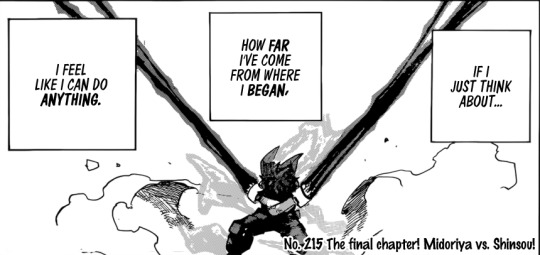
I mean, ya not wrong, buddy! You pretty much can do anything if Mr. Author’s plot dictates it. Because who gives a fuck about feeling like there are any stakes in anything or making the world seem real; amirite, Hori?

Shinsou again with the super relatability. P sure a lot of us are goddamn incredulous about the overplayed ‘struggling with new quirk manifestation’ drama, now that Izuku is magically instantly proficient. Because that’s how quirks have worked up until this point.......

Oh no...! Back down to 8% with no air force attack for a hot second?? WHAT A NERF! Whatever will he do?? ...Oh. Still win everything. So who gives a fuck. Does anybody really believe these percentages don’t just mean whatever Hori wants them to at any given moment anyway?
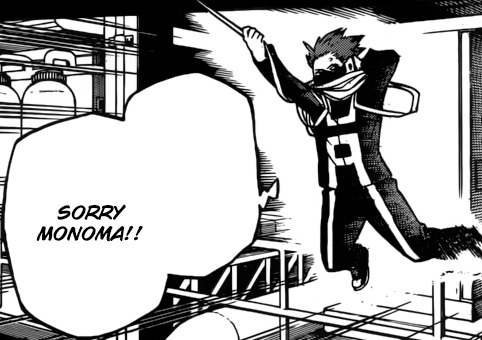

Yo, I’m sorry. Apologizing for the author who hyped some fantastic MonoShin collaboration and then did everything he could to prevent that from happening. Bitch.
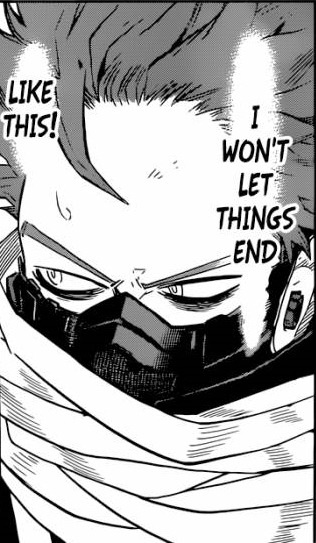
But then...they did? Sooooooooo...? What the fuck’s the point of Shinsou recovering his mask and going for another plan? Legit nothing came of this. Why does this panel--no, most of this chapter even exist?? Like I get that it’s supposed to look like a struggle between the teams, but it’s all just...super contrived the way it ends, my dudes. This is bullshit writing, k.

Okay, I frickin’ loved this scene. I can be mad as all hell and still admit this was enjoyable. The quirk meta, the mind games, and Monoma’s zero-grav hair.
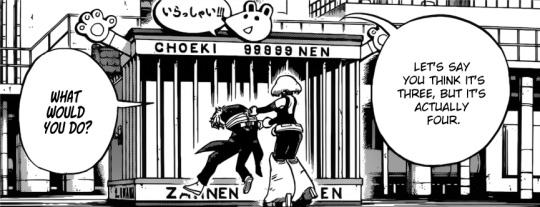
Okay, but did he really need another fucking limit on his quirk??? Time limit, one-at-a-time limit, potentially type limit (not able to copy mutant quirks--but that’s just speculation/headcanon for now)...and now number limit? WHILE IZUKU IS GETTING SIX WHOLE FUCKING PERMA-QUIRKS FOR GODDAMN FREE??
YEAH OKAY, LET’S TALK ABOUT THAT. I saw a post I mostly disagreed with and disliked (and don’t care to identify or quote; I can’t even remember whose it was or anything) saying this six-new-abilities ability is going to erase the need for a ton of other already-existing characters. Sero, as an example, since Black Whip basically usurps his specialty and more. On principle, as the worldbuilding has stood up until this point, I disagreed that characters like Sero would become useless. The way society has been trending, teamwork has been increasingly essential and encouraged. That means two people with lasso/tape-like quirks would do just fine! There can be more than one person with a similar quirk! Hell, that’s all Monoma’s quirk is--a temporary second of one that already exists. OR TETSUTETSU AND KIRISHIMA MUCH? They’re both useful! Even together!
So as a general principle, people with similar quirks can and do exist just fine in the same universe and even same space and role. The danger exists only if the author is so irresponsible as to consciously edge out the other characters by letting his pet character take care of everything by himself. Which seems like exactly what Izuku’s new six-quirks is at risk of doing now. Sure, argue Uraraka was useful and that Izuku relied on her this time, mmkay, but wait until he gets his own antigrav quirk, lol. Like, at this point, I honestly don’t trust Hori not to fuck up the beautiful character synergies and contrasts he’s already built. Because he sure did fuck up a lot of things that had great potential this arc already. Often by stepping on the ‘little’ guys. Fuck you, Tokage didn’t deserve that, and Baku didn’t deserve to dominate that hard. Where is the goddamn sense of struggle and achievement? Aight, that’s a rant for another day...
Anyway, back on track, call me biased as hell, but usurping the specialty of the guy whose ONLY NICHE WAS BEING THE ONLY ONE WITH VERSATILE MULTI-QUIRK USAGE? AND GAINING MULTIPLE QUIRKS BUT WITHOUT SEVERAL OF MONOMA’S LIMITING FACTORS? Gooooooooooo fuck yourself, ‘blessed boy’.

But...HE DIDN’T, THOUGH? Monoma’s ace-in-the-hole surprise Twin Impact stunned Mr. Protagonist for an amazing two whole seconds! Because of course; the fuck were we all thinking hoping other people mattered in this story or stood a chance against plot-device-convenient auto-scaling levels of OP? Like why even try tbh???
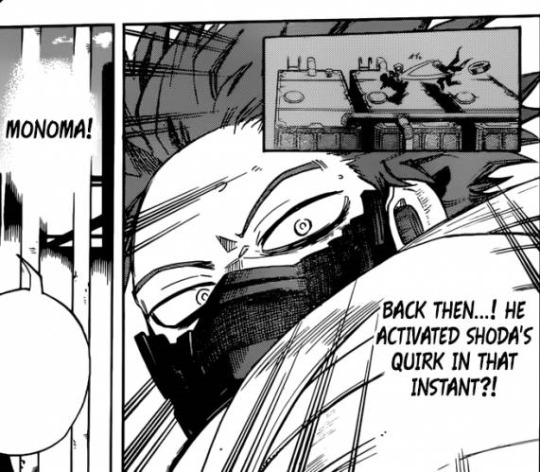
Shinsou fucking gets it. We all get it; it was an amazing play. But protagonist privilege too strong; what the fuck can you do.

Oh yep, here’s a more accurate translation, given the goddamn results.

Hahahahaha, amazing, even literally everybody in-character gets it. Team 5-B had every right to win this shit. But then...!
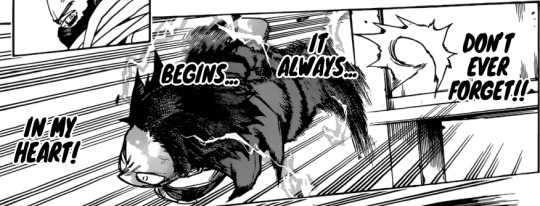
Oh boy!!! Generic shonen anime protagonist inspiration spiel to the contrived-Hori-plot rescue! Now, with these magic thoughts, he will win! Amazing how that works!
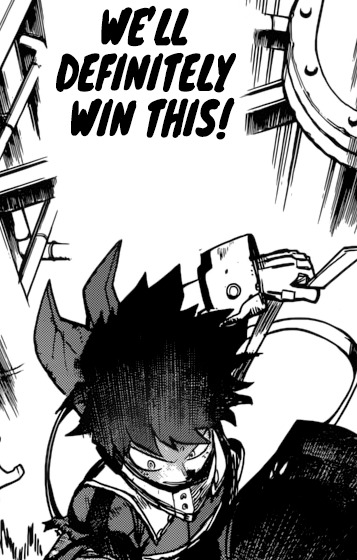
Well yeah, no shit, it makes sense for you to have that kind of confidence, considering that’s legit how your protagonist life works. Congrats on the contrived win, dude; I know you’re not surprised. Y’all, I know this isn’t in-world Izuku’s fault; he’s doing his best which is what he should be doing. It’s the shitty writing, plain and simple. Don’t blame the kid that gets everything; blame the one who spoils them at the expense of others. So perhaps calling me petty would be deserved, but my bitterness can’t help but leak out towards the character as well; it’s just human nature. I don’t like Baku as much as I used to either, because all the interesting bits are gone now that he’s OP and comparably perfect. At least Hori kinda kicked Shouto to the OP-privilege curb a little; makes him more realistic, relatable, and likable.
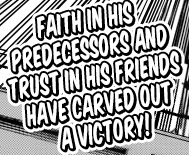
Ohhhh god, generic shonen anime faux-inspirational epilogue to put the icing on the shit cake; brb gagging.
Alright, so let’s summarize all the implied morals to the story here!:
Things turned around at the very end for basically no other reason than Hori wanted Team Protag to win.
All the dipshits were actually right; class B is legit inferior to class A, as evidenced by the results of literally every time they’ve directly faced each other. 1 win to 3 this time, bitch, and don’t make me remind of the sports festival. Even though B class clearly has better teamwork and synergy. Screw that, A more powerful, A smash. A main character class; A win.
Monoma, your backstory classmates were right, turns out! You are apparently an ineffective hero student who just keeps losing! You’ll never be more than a side character to be used, abused, and discarded. Fuck your aspirations, fan-fucking-tastic.
Shinsou, don’t kid yourself; you haven’t fucking changed. You got beaten by the same dude in nearly the exact same fashion. Your entire arc was fucking pointless; have fun in general studies! (In honesty, if Hori has any remaining shred of sensibility, I think he might let Shinsou into hero course anyway? Did they ever say Shinsou technically had to win both of his matches? Or just show progress? Who fucking knows at this point.)
Everybody who didn’t need to be reminded they’re great won. Are you not inspired?
Beautiful. Beautiful goddamn arc, Horikoshi; you taught us the important things in this world. Applause. I will honestly punch myself in the face in ecstatic shock if Hori manages to pull some way out of his ass to make this a satisfying conclusion.
My final thoughts:

Fuck this shit, I’m out.
#ooc#bnha 215#bnha manga#monoma neito#monoma#shinsou hitoshi#shinsou#MonoShin#shinoma#class 1b#cw: rant#cw: fandom negativity
150 notes
·
View notes
Text
Can Startups Save Primary Care?

By ANDY MYCHKOVSKY
Today, primary care is considered the bee’s knees of value-based care delivery. Instead of being viewed as the punter of the football team, the primary care physician (PCP) has become the quarterback of the patient’s care team, calling plays for both clinical and social services. The entire concept of the accountable care organization (ACO) or patient-centered medical home (PCMH) crumbles without financially- and clinically-aligned PCPs. This sea change has resulted in rapid employment or alignment to health systems, as well as a surge in venture capital being invested into the primary care space.
Before we get too far in the weeds, let’s first begin with the definition of primary care. The American Academy of Family Physicians (AAFP) defines a primary care physician as a specialist typically trained in Family Medicine, Internal Medicine, or Pediatrics. Some women do use their OB/GYN as their PCP, but these specialists are not traditionally considered PCPs. Now if you’ve gone to your local PCP and noticed that your care provider is not wearing a white coat with the “MD” or “DO” credentials, you are either receiving treatment from a hipster physician, nurse practitioner (NP), or physician assistant (PA). Two of the three professionals are trained in family medicine and can provide primary care services under the responsibility of an associated PCP. At least one of the three has a beard.
The crazy thing is, despite the industries heightened focus on the importance of PCPs, we’re still expecting a shortage of primary care providers. In April 2019, the Association of American Medical Colleges (AAMC) released a report estimating a shortage of between 21,100 and 55,200 PCPs by 2032. Given we just passed 2020, this not that far off. The primary reason for the shortage is the growing and aging population. Thanks mom and dad. Digging into the numbers will really knock your socks off, with the U.S. Census estimating that individuals over the age of 65 will increase 48% over that same time period. Like a double-edged sword, the issue is not just on the patient demand side though. One-third of all currently active doctors will be older than 65 in the next decade and could begin to retire. Many of these individuals are independent PCPs who have resisted employment by large health systems.

Now the easiest solution would be to wave a magic wand and dramatically increase the supply of medical students selecting primary care versus other specialties. However, in the absence of any Hogwarts-trained healthcare enthusiasts, we have to face the realities of today’s medical school situation. 75% of medical school students in the class of 2018 graduated with student debt, with the average loan debt of $196,520. With that loan balance, you’d owe approximately $2,212 a month on a standard, 10-year federal repayment plan. If you compare that with the earning potential, pediatrics and family medicine are consistently among the lowest paid specialties. According to Medscape, in 2019 PCPs earned an average of $237,000, while specialists earned an average of $341,000. That is a big difference. This all despite the fact that according to a Merritt Hawkins report estimating PCPs generated $2.1 million for their affiliated hospitals in the previous 12 months. This referral value to the hospital even exceeded Otolaryngology ($1.9 million), despite the fact the average annual physician compensation for an Otolaryngologist is $471,000.
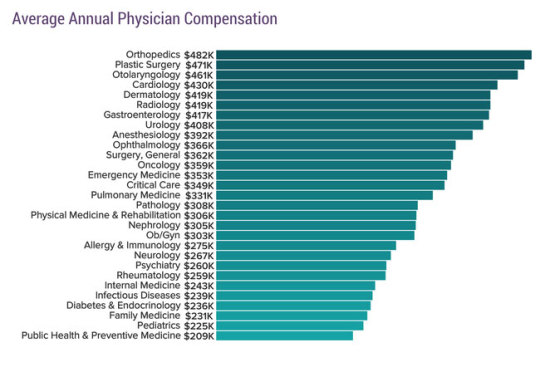
The other important characteristic that healthcare economists and researchers have closely monitored is increase in hospital employment and alignment of PCPs versus physicians who own their own independent practices. The fear being that employed PCPs have the potential to refer testing, therapies, and services back to the mothership hospital, as opposed to independent specialists, labs, ambulatory surgical centers, or imaging centers. These hospitals charge considerably higher professional and facility fees, particularly for commercially insured patients. The crazy part of value-based care is that some of the clinically integrated network (CIN) provisions and waivers associated with primary care allow hospitals to align networks of independent PCPs and ensure they receive much higher negotiated rates. Aligning PCP networks to highly motivated and sophisticated health systems who are actively involved in significant downside risk contracts has clear benefits, but the potential for inefficiency and shoring up referral patterns does exist.
Now back to the world of healthcare startups as they relate to primary care. I’ve said it before and I’ll say it again, the successful One Medical (NASDAQ: ONEM) IPO was the single best thing for primary care startups. Yes, they focus on a particular clientele (commercially insured in urban markets). Yes, they are charging a $199 annual fee for access to their care that many Americans cannot afford. Yes, they will likely grow revenue through higher volume and negotiated reimbursement contracts by partnering with health systems, referred to as health networks. However, 3 weeks after the IPO, the company maintains a market valuation cap of $2.8 billion with nine months of net revenue equaling $199 million and $34 million is losses during the same time period. That is impressive and should be encouraging for current PCP startups.

There are a ton of other primary care focused startups and companies that should not be overshadowed. Each takes on a slightly different approach, whether they focus on a specific population (e.g., Medicare Advantage), actually employ physicians themselves, or serve as administratively- and clinically-aligned vendors for networks of PCPs. I strongly believe in the value of these organizations using technology-driven communication, remote monitoring, home care, and intensive wrap-around care management services for complex populations to offer a new model of care.
If there was ever a downside for creating the primary care-led revolution towards value-based care, I believe it would be the production of charlatans claiming to “primary care consultants” or point-solutions that only affect a sliver of the problem. I see lots of claims related to SAAS startups who utilize an AI-based, machine learning analytics program that spits out a list of high-risk patients. After many years trying to squeeze clinical and financial value out of total-cost-of-care models, that is no longer enough. In my opinion, PCPs should seek partners who can not only provide technology, but also have clinical resources and are willing to stand by their performance in terms of compensation. No guaranteed PMPMs if performance doesn’t add measurable and definitive value, unless the organization is willing to take downside risk exposure. They also need to help your PCP organization understand how to set the rules of the game in your advantage. Otherwise, you will never win regardless of performance (e.g., trend rates, minimum savings thresholds, rebasing, shared savings, etc.).
Now I’m not claiming I know everything, but my experience was borne out of helping health systems and physician groups across the country manage total-cost-of-care contracts in Medicare fee-for-service (FFS), Medicare Advantage, Commercial, and Medicaid managed care while at Evolent Health. For those unaware, Evolent Care Partners is a solution focused on enabling independent PCPs with the capital and resources needed to participate and succeed within two-sided contracts. In addition to Evolent Health, there are a bunch of other primary care startups that I appreciate. They did not pay me (although I should’ve asked before), but here are a few startups that I would research before thinking about primary care in a value-based care world.
One Medical: Provider for Commercial
Iora Health: Provider for Medicare
Oak Street Health: Provider for Medicare
ChenMed: Provider for Medicare
Privia Health: Population health management partner for primary care
VillageMD: Population health management partner for primary care / provider
Aledade: Population health management partner for independent primary care
At the end of the day, primary care still receives a pitiful amount of the total spend in healthcare. The best estimates believe only 5-7% of healthcare spending devoted to primary care. In a RAND Corporation study, researchers predicted 2.12-4.88% of total Medicare fee-for-service medical and prescription drug spending. However, the power of referral, care management, and addressing the social determinants of health (e.g., housing, food, transportation, etc.) holds the promise of a better tomorrow. I am hopeful that the trends over the past few years will continue and new startups will be developed that further innovate on the $260 billion primary care market in the U.S..
Andy Mychkovsky is the creator of Healthcare Pizza, where this article first appeared.
The post Can Startups Save Primary Care? appeared first on The Health Care Blog.
Can Startups Save Primary Care? published first on https://venabeahan.tumblr.com
0 notes
Text
Can Startups Save Primary Care?

By ANDY MYCHKOVSKY
Today, primary care is considered the bee’s knees of value-based care delivery. Instead of being viewed as the punter of the football team, the primary care physician (PCP) has become the quarterback of the patient’s care team, calling plays for both clinical and social services. The entire concept of the accountable care organization (ACO) or patient-centered medical home (PCMH) crumbles without financially- and clinically-aligned PCPs. This sea change has resulted in rapid employment or alignment to health systems, as well as a surge in venture capital being invested into the primary care space.
Before we get too far in the weeds, let’s first begin with the definition of primary care. The American Academy of Family Physicians (AAFP) defines a primary care physician as a specialist typically trained in Family Medicine, Internal Medicine, or Pediatrics. Some women do use their OB/GYN as their PCP, but these specialists are not traditionally considered PCPs. Now if you’ve gone to your local PCP and noticed that your care provider is not wearing a white coat with the “MD” or “DO” credentials, you are either receiving treatment from a hipster physician, nurse practitioner (NP), or physician assistant (PA). Two of the three professionals are trained in family medicine and can provide primary care services under the responsibility of an associated PCP. At least one of the three has a beard.
The crazy thing is, despite the industries heightened focus on the importance of PCPs, we’re still expecting a shortage of primary care providers. In April 2019, the Association of American Medical Colleges (AAMC) released a report estimating a shortage of between 21,100 and 55,200 PCPs by 2032. Given we just passed 2020, this not that far off. The primary reason for the shortage is the growing and aging population. Thanks mom and dad. Digging into the numbers will really knock your socks off, with the U.S. Census estimating that individuals over the age of 65 will increase 48% over that same time period. Like a double-edged sword, the issue is not just on the patient demand side though. One-third of all currently active doctors will be older than 65 in the next decade and could begin to retire. Many of these individuals are independent PCPs who have resisted employment by large health systems.

Now the easiest solution would be to wave a magic wand and dramatically increase the supply of medical students selecting primary care versus other specialties. However, in the absence of any Hogwarts-trained healthcare enthusiasts, we have to face the realities of today’s medical school situation. 75% of medical school students in the class of 2018 graduated with student debt, with the average loan debt of $196,520. With that loan balance, you’d owe approximately $2,212 a month on a standard, 10-year federal repayment plan. If you compare that with the earning potential, pediatrics and family medicine are consistently among the lowest paid specialties. According to Medscape, in 2019 PCPs earned an average of $237,000, while specialists earned an average of $341,000. That is a big difference. This all despite the fact that according to a Merritt Hawkins report estimating PCPs generated $2.1 million for their affiliated hospitals in the previous 12 months. This referral value to the hospital even exceeded Otolaryngology ($1.9 million), despite the fact the average annual physician compensation for an Otolaryngologist is $471,000.
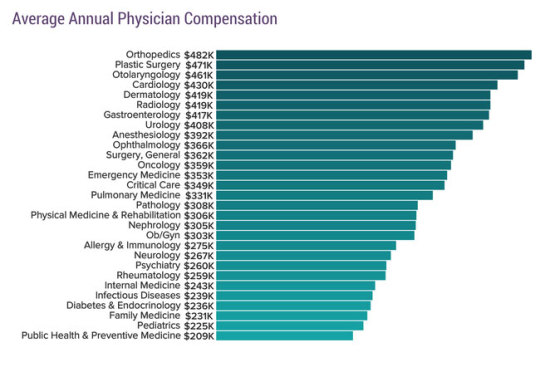
The other important characteristic that healthcare economists and researchers have closely monitored is increase in hospital employment and alignment of PCPs versus physicians who own their own independent practices. The fear being that employed PCPs have the potential to refer testing, therapies, and services back to the mothership hospital, as opposed to independent specialists, labs, ambulatory surgical centers, or imaging centers. These hospitals charge considerably higher professional and facility fees, particularly for commercially insured patients. The crazy part of value-based care is that some of the clinically integrated network (CIN) provisions and waivers associated with primary care allow hospitals to align networks of independent PCPs and ensure they receive much higher negotiated rates. Aligning PCP networks to highly motivated and sophisticated health systems who are actively involved in significant downside risk contracts has clear benefits, but the potential for inefficiency and shoring up referral patterns does exist.
Now back to the world of healthcare startups as they relate to primary care. I’ve said it before and I’ll say it again, the successful One Medical (NASDAQ: ONEM) IPO was the single best thing for primary care startups. Yes, they focus on a particular clientele (commercially insured in urban markets). Yes, they are charging a $199 annual fee for access to their care that many Americans cannot afford. Yes, they will likely grow revenue through higher volume and negotiated reimbursement contracts by partnering with health systems, referred to as health networks. However, 3 weeks after the IPO, the company maintains a market valuation cap of $2.8 billion with nine months of net revenue equaling $199 million and $34 million is losses during the same time period. That is impressive and should be encouraging for current PCP startups.

There are a ton of other primary care focused startups and companies that should not be overshadowed. Each takes on a slightly different approach, whether they focus on a specific population (e.g., Medicare Advantage), actually employ physicians themselves, or serve as administratively- and clinically-aligned vendors for networks of PCPs. I strongly believe in the value of these organizations using technology-driven communication, remote monitoring, home care, and intensive wrap-around care management services for complex populations to offer a new model of care.
If there was ever a downside for creating the primary care-led revolution towards value-based care, I believe it would be the production of charlatans claiming to “primary care consultants” or point-solutions that only affect a sliver of the problem. I see lots of claims related to SAAS startups who utilize an AI-based, machine learning analytics program that spits out a list of high-risk patients. After many years trying to squeeze clinical and financial value out of total-cost-of-care models, that is no longer enough. In my opinion, PCPs should seek partners who can not only provide technology, but also have clinical resources and are willing to stand by their performance in terms of compensation. No guaranteed PMPMs if performance doesn’t add measurable and definitive value, unless the organization is willing to take downside risk exposure. They also need to help your PCP organization understand how to set the rules of the game in your advantage. Otherwise, you will never win regardless of performance (e.g., trend rates, minimum savings thresholds, rebasing, shared savings, etc.).
Now I’m not claiming I know everything, but my experience was borne out of helping health systems and physician groups across the country manage total-cost-of-care contracts in Medicare fee-for-service (FFS), Medicare Advantage, Commercial, and Medicaid managed care while at Evolent Health. For those unaware, Evolent Care Partners is a solution focused on enabling independent PCPs with the capital and resources needed to participate and succeed within two-sided contracts. In addition to Evolent Health, there are a bunch of other primary care startups that I appreciate. They did not pay me (although I should’ve asked before), but here are a few startups that I would research before thinking about primary care in a value-based care world.
One Medical: Provider for Commercial
Iora Health: Provider for Medicare
Oak Street Health: Provider for Medicare
ChenMed: Provider for Medicare
Privia Health: Population health management partner for primary care
VillageMD: Population health management partner for primary care / provider
Aledade: Population health management partner for independent primary care
At the end of the day, primary care still receives a pitiful amount of the total spend in healthcare. The best estimates believe only 5-7% of healthcare spending devoted to primary care. In a RAND Corporation study, researchers predicted 2.12-4.88% of total Medicare fee-for-service medical and prescription drug spending. However, the power of referral, care management, and addressing the social determinants of health (e.g., housing, food, transportation, etc.) holds the promise of a better tomorrow. I am hopeful that the trends over the past few years will continue and new startups will be developed that further innovate on the $260 billion primary care market in the U.S..
Andy Mychkovsky is the creator of Healthcare Pizza, where this article first appeared.
The post Can Startups Save Primary Care? appeared first on The Health Care Blog.
Can Startups Save Primary Care? published first on https://wittooth.tumblr.com/
0 notes
Text
Real Estate Lead Generation Facebook Ad Ideas for Real Estate Agents
youtube
This discussion covers real estate lead generation with facebook ads complete with tips and ideas that are working in 2019. I interview ads expert Obi Okere (a fellow New Jersey native) who's spent over 5 million dollars in ad spend on Facebook in the last 3 years.
We cover 3 main topics in today's Facebook Ad Lead Generation Ideas Q/A Session.
Real Estate Advertising Followup and Automation
Real Estate Ad Targeting and Attracting Your Ideal Clients Using Facebook Ads
Writing Effective Facebook Real Estate Ad Copy/Content
Resources in the episode:
Zapier
Manychat
AdEspresso
Social Media Examiner
Aweber
Facebook Ads Library
New Construction Marketing Mastery Free Training
Damon : Every one on Damon Greene here with
Damon: the iconic agent. Today we'll be talking all things real estate, Facebook ads. And today I have a special guest with me. A Gentlemen I met about three weeks ago at a marketing conference. I like to say, not only do I teach this stuff, mentor and train myself, but I also go and I am mentored and go to trainings. Consistently. I Met this awesome gentlemen, Obi Okeei. We had dinner during one of the breakout sessions. We got to spark a conversation. I found out this guy has spent a whole lot of money on Facebook ads. So we chopped it up Facebook marketing and marketing in general. So I wanted to bring him on as another Facebook ads expert to kind of answer questions. We've got a poll that we took. We're going to cover the poll questions for the, about the first 15 minutes. Ask questions on the Facebook page as they come and we'll answer those afterwards. So Obi, thank you for joining us and just give us a little insight on yourself for folks that have never heard of you or don't know who you are and what you do.
Obi: So to everyone that's never heard of me. My name is Obi Okere and I have been in digital marketing for the last five years with a specialty in Google and Facebook ads. To date, I've probably spent over $6 million on Facebook and ecommerce, real estate, and all types of lead generation, you name it, I've probably done it. And so, I'm happy today to be on this call. Thank you Damon, for inviting me. And I'd love to share some insights that I've learned over the years of running Facebook ads, especially as it relates to marketing real estate listings and just things that I found work currently right now in the market.
Damon : Awesome. Awesome. So let me see. I want to make sure that, uh, let's see, we're here a lot to make sure. Okay, let me, I got to post this link really quickly in the group on the Facebook. Let's see on the Facebook events page just in case folks can't find it. Then we'll go ahead and get started. While I do that. We took a poll and one of the public free Facebook groups that I have…all around new construction marketing for real estate agents. And we sparked the conversation and ran a poll around the top five things that you, the audience wanted. And the top three were followup and automation was number one, number two was ad targeting and finding your ideal client. And of course number three was ad copy and messaging. So Obi…I'm going to go ahead and paste this link over here real quick. As far as your expertise, give us some insight on ways that real estate agents can use follow up automation…however you interpret that follow up automation and then I'll come back and kind of give some advice. In the new construction marketing mastery program, we've got a complete system set up with followup automation. But I know you have spent a whole lot more money on Facebook ads than I have, so I definitely want to get your insights.
Obi: So one of the things that I've really found to be effective for followup automation on a Facebook ads are leveraging Facebook messenger ads. So basically what that looks like is somebody clicks on an ad and then they, the response goes into messenger and they get put into an automation where they have the opportunity to be fielded some questions that allow the realtor to qualify that potential client with a number of questions. For example, you know, what you looking for, are you looking to buy or rent, how much is your budget? All questions like that, that allow that realtor to qualify the prospect. So that then after the automation is done, that real estate agent can then step in as a human within Facebook messenger to contact that person, in Facebook messenger or over the phone. So that as far as I've seen, that's probably the most innovative or the newest innovation in the market right now, leveraging Facebook messenger to do that automation.
Damon : Okay. And yeah, I totally don't know why I hadn't thought about that because I actually use the bots in my own marketing. That's definitely something that folks would want to look out for. Now one of the other things that I do at ties along with what Obi said, and you can combine the two together… If you use tools such as Zapier, which is basically glue, I consider Zapier glue, it ties everything together. You know we use in the new construction marketing mastery training, we use Zapier , call fire, slybroadcast and then your choice, we use a Weber, but your choice of email autoresponder to instantly send text messages as soon as leads come in. If you use a Bot, you qualify them, then you instantly send a text message, because you're 90% likely to lose that lead If you do not reach out then five to 15 minutes or 15 minutes on the high end.
Damon : We also instantly send a voice broadcast to that lead. And then you'll also want to obviously send them an email as well. So that's the general follow up and automation. And as far as automation between the many Chat Bot, is that what you use Obi? Between the many Chat Bot and Zapier, they all tie together. You can put all this together to good package and really almost have yourself like an ISA when your leads come in. One of the biggest problems that I see agents talk about, number one, their followup is horrible. No offense to you guys that aren't, but if you know, your follow up is horrible, these help, but you still need to follow up. And leveraging these tools will help you instantly follow up.
Damon : But when you sent a text message, you send an email, each one of those, the whole goal of that communication should be to get a response. So a lot of agents say, Hey, I get crap leads. These leads are no good. They're just looky loos. And yes, that is the case, but eventually they will probably convert. But if you don't have the tools in place and you're not trying to weed out those folks that are ready now, you're not going to get as good a result. So for instance, the first email goes out and says, Hey, Mr Lead is lead. My name is Obi. I sent you some information on this project. When is a good time to talk? Now you're leaving the ownness on them. So when we're talking about follow up and motivation, you always want to use your automation to follow up to get a response.
Damon : And then you, you want to leave me the heck alone, call me at five. I'll be ready next week. I'm just going. But you want some response because those people respond. Now you can engage and start a conversation because all of this is digital. It's not completely digital. Even a text message follow back and forth. The testaments jtext messages say, Hey, I just sent you information over if what's a good time to talk? They can respond back to you and you can start a conversation and then you work your magic as a real estate agent from there. Let me see if we have any questions on there. What tool do you prefer for Facebook messenger automation? Nicole, we just thought about that many chat. It's free or $10 a month unless you're doing insane amounts of traffic, then I think it's a couple dollars more of it. but many chat is a really easy to use tool it's literally drag and drop. What else do you uh, use for automation or recommendation? Obi.
Obi: Many chat and Zapier. Those are my two go-tos. And then any email, ESP, email marketing tool that you prefer to use that for after that? Those are, those are my three main. Okay.
Damon : Okay. All right, cool. Now here's the one that everybody kinda falls over …Ad Targeting. Now I'll say first and then I'm gonna let you go Obi because I know you've got a lot more data behind this than I do, but when you're targeting ads, there's actually, this isn't a question, but it's something that came in. It talks about Facebook recently removed the likely to move behavior from their audience, options, behaviors, demographics…what interests and all that work for buyers and sellers. Now, the first thing I'll tell you, which is what 90% of real estate agents don't do. You do not serve everyone or you serve no one. You have to determine who is your ideal client. Literally take a pen and a paper and just right down who your ideal client is…when you know your ideal client with… For instance me in the real estate niche, you're reading this transcript or watching this video because you are more than likely my ideal client, I found out how to reach you and I put a message in front of you that resonated.
Damon : That's exactly what you need to do from a high level. So you need to know who your ideal client is. I talked to people strategy calls, a couple dozen people a week and who do you serve? I serve everyone. Anybody you can't have that. You can't do that. You have to serve a specific person and when you determine who your ideal client is, you just find out where more of those people are. Everybody else really doesn't matter. Now that probably doesn't answer the question as far as targeted specifically, but it actually ties in with the next discussion. We're going to have however Obi… Go ahead and give your take on that.
Obi: Alright. So targeting is a really interesting thing when it comes to Facebook ads on, um, when you're marketing a new development or different listings. This is something that I learned while running actually ecommerce campaign for a major sock brand. And during black Friday we spent $1 million just on black Friday and $1 million on that Saturday, Sunday and `Monday. And the craziest thing was, which was counter intuitive to what I ever thought is to basically use your ad as a weed out tool. So whoever you think your prospective client is, you'd put that into your ad copy. You could take that into consideration as you put your ad copy together and you market to a specific zip code as a whole. And so that will be everybody within that specific zip code, within your ideal ages that you're targeting and you just let the campaign run.
Obi: It's worked very well for me for some of the new development ad campaigns that I've ran where I've seen the leads that came in at a five to $10 cost per lead. And it's, it's really interesting because basically what that does is allows Facebook to do the work in terms of determining who to show your ad to especially those who are already in market to move or in market to buy or in market to rent. And so it, it's it, I didn't understand it but when I started to try it and test it out it, it works very well. Um, and something else that you can also a/b test against that strategy is to leverage the detailed targeting box at the ad set level. And let's say for example, you know that your target customer, they're interested in maybe entertainment or you have a target customer that's more family oriented. If they're entertainment, then you would want to check that entertainment box within the detailed targeting area at the asset level. Or if let's say you're targeting families, then you could target people who live in a single family home and you can geo target two zip codes that are near schools or that have a shopping amenities nearby. Those are some other things that you can leverage to a/b test against just blasting out to everybody within a certain zip code.
Damon : let me stop you real quick and I ask you something. Sure, sure. I know what it is, but just to be clear so they understand what is a/b testing?
Obi: Okay. So Ab testing is basically, taking two I to ideas. You have a hypothesis that this may work or that may work and you can try both of them against the same audience to see whether or not which idea or hypothesis will be more effective. So you can do that with ads. You can take, u two different ads and run it against the same target.
Damon : So you could take like a, a video ad and an image ad and test those two against each other to see which one resonates best has a lower cost per lead or the best reactions, right?
Obi: That's right. Or you can take the same ad and target and run it through two different areas to see which area, uh, resonates more with that one ad. And so that's ab testing in a nutshell.
Damon : Okay, cool. And yeah, and to add to that, and this actually ties in very close with the next, you know, ad copy. But as far as your ideal client, one area, if you're looking for high end clients and $250,000, is not high end, but that's kind of the start. And luxury is subjective depending on the market. But if you're looking for folks that have money and you're tired, you lose test out. It's not guaranteed to work in every market. Cause every, you can go from Tampa to Orlando and it can be completely different results. That's why you have to test. But try within your targeting …American Express. Because folks that like American Express are typically folks that have American Express cards. And if you have an American Express card, it means you have good credit, you have good credit, it means you're probably able to buy a home.
Damon : So that's a little small nugget to test out. But also ask yourself, and you know, we have a guided questionnaire that I'm actually putting in one of the trainings that I have, which is as far as your ideal client, ask yourself, what do they read? What types of publications, what types of books, what types of magazines, what types of websites do they visit? What kind of movies do they watch? What are their interests? Are they interested in golf? Are they should in boating? Are they interested in race, car driving? Are they interested in shopping? You want to get with your ideal client, kind of build those things out. You know, are they sending their kids to private schools? Is there a local private school that they'd send them to? Or, you know, there's so many things that you can dive into that will help you get in the mind of your ideal client.
Damon : And then you can use the audience insights tool, which I don't hear too many people talk about much anymore, but you can actually use the audience insights tool in Facebook in your Facebook audience dashboard type of few of those in and get some more interest as to what folks like …now you can group your ads, your ad groups together and see, hey, let's see if this works. The main thing you have to do the homework up front and you've got to know who your ideal client is. You mentioned something and this is kind of going to the next topic….videos.
Obi: I have some other the ideas to share. So another thing that's available within Facebook is being able to target, how by household income. And so you can target a specific area by zip code city or states and within the detailed targeting box…If you type in income, you should be able to get the option that will show up for you to choose people who have a certain household income. So you can target at the highest threshold or at the lower threshold.
Damon : They do have those thresholds. But you gotta be careful with real estate ads because sometimes you can get them through, but sometimes they'll tag you as being being discriminatory. I've had ads go through and some not. So that's something you'll have to, you know, give a try to. Yeah, because they took those away, these specific zip code pin dropping they're a little funky there. But that's why knowing your ideal client and using other targeting strategies, things they like, things they read, TV stations, shows, news sites, American Express, things like that. And you can really kind of hone in on on that. Now there's also social media examiner and adespresso, they have really good case studies and articles on Facebook marketing and also they have Facebook case studies where they have different audiences, but it's all about testing.
Damon : There is no one size fits all. I've seen things work in California that don't work in Florida or some works in Tampa that doesn't work in Miami. So you have to be the expert of your area. That's why it's important. There's no cookie cutter system…you can't be lazy with it. There's no cookie cutter. You've got to put the work in. But once you get something working, it's great. And the other thing, and I'm going to let you touch on this too Obi…the key is you've got to keep running your ads because what you're doing, if anybody's a chef out there, anybody cooks. I love cooking because I love the heat. So cast iron skillet, you get your cast iron skillet. Like if you've got grandma's care started skillet, nothing's will taste better than anything off of that cast iron skillet because it's been seasoned those years of cooking.
Damon : And the oils and the essence of the food has been cooked on their drip, then that's like your Facebook pixel. So the more you go, as long as you're targeting, right, Facebook gets smarter and says, okay, we need more of these people. So the other thing is you have to run ads consistently. You can't spend $50 and think, oh, I didn't get any leads and shut it off. You're not going to see results, you have to run. Not, I'm saying you have to run $1 million, like Obi but you've got to run consistently and get something good going and then it gets easier in time because you're literally seasoning that Pixel. And on the flip side, I know we talked a little earlier before we got on this call about remarketing. So as far as targeting, what are your thoughts on video remarketing and the types of remarketing that you are able to use if you have those resources.
Obi: So in terms of re marketing, one of the things that I like to do is to remakret to those who visited either the landing page or clicked on the ad, but didn't actually convert, and I'll create an audience with that for anyone did that in the last seven days. And I would just run the same ad to them because sometimes people are in a hurry, they click on an ad, they look at it, they say, oh, that looks nice. I'm, I'm interested, but don't have the time to actually input their information. Or they might've gotten distracted, whatever. Something prevented them from actually following through. And what I like to do is to remind them about their original intention because they did raise their hands and say, I'm interested because they went onto the website or clicked on the ad and I'll just show them the same ad again. If you think about it, how many times have you seen a commercial the first time? And said, that's it. That's an interesting commercial. And then you see that same commercial four or five times. Then you, by the fifth time you're thinking, you know what I, I think I might need that. So there's nothing wrong with just showing the same ad again to the same person who is already showing that they're interested.
Damon : Okay. And to tie to that, we do have a question. How do you use Facebook ads to target prospects who have visited specific Google ads, builder pages and other locations effectively? Now Nicole , I know you are in the new construction marketing mastery program, that is actually something we will be covering very soon. But basically when you set up the Google ads or you have your own pages, just like you drop the Google Pixel, you drop the Facebook Pixel, now you can create a remarketing audience to follow them around the Internet, anywhere, Facebook, Instagram, CNN, Fox News, ESPN. Because you had those two pixels, you can follow them around and we're going to go deeper into that with a step by step and show you how to do that. But that's an awesome question. And actually you're the first person that asked that. I've, I've been talking about that. That's actually something that we will have coming up. So let's see, we've got about six minutes left. So let's dive into ad copy. What are your thoughts on ad copy?
Obi: Ad copy…what I like to do before I write anything, I like to research all of the community groups, message boards and just read about, um, what people are talking about in the neighborhood. And I think that's really important because what it does, it just puts you in the shoes of your target customer or the community that you're looking to market. And it just envelops you and follows you in the whole experience. And so once you are able to really put yourself in their shoes and engage in that experience, it puts you in a better place to actually write ad copy that you know, would be appealing to your target client. And that at a high level is the approach that I take to ad copy. It's very important to be able to empathize with your target client.
Damon : Yup, and I'm going to tie it to that because one thing I would say is whoever your ideal client is, if you, if you're a new agent, you'll probably have to talk to a veteran agent, but if you're an agent has closed several transactions, go back to all those folks that you close and talk to them and say, hey, how was the experience? You know, what were your fears? What were you afraid of? Get to know them. And I'll give you a perfect example with me. I speak to dozens of real estate agents weekly. I take notes on every call. I have two or three pages of notes after each call. I take the notes, I'm listening to what they're saying to see if they're a good fit because I don't let everyone in the program, but I've got hundreds of these notes from folks that did join the program and those that weren't a good fit.
Damon : Regardless…I go through every probably quarter and I literally just dive into, because these are my ideal clients. I dive into the pain points, what were the challenges they were having, et Cetera, and then that's what I used to extract new Ad copy. Something else I highly recommend and you tell me your thoughts on this. I'll bring it from a real estate perspective. Use Videos, whether it's you on video or whether it's a walk through video, because most real estate agents, number one, they're afraid of doing video two, they think it's more difficult than need to. All you need is a modern smart phone and a good mic, that's all you need. Use video because Facebook favors video. With video anybody that watches your video for say 25% of the video or 50% you can then do what Obi talking about earlier. You can remarket to them, but video is huge and if you're on camera, I can speak to you on video like some of you have seen my videos and are seeing your own videos now on Facebook and Instagram. I'm talking directly to you. I'm asking you questions. I'm saying, hey, does this message resonate with you? If it does, then you give me your name, email and phone number. And we get on a call, we talk where you watched the training. So that is something that you can do. What other tips do you have around ad copy?
Obi: One of the things that I like to do to add some structure is I build out a grid. And so at the top of the grid it would say their present state and the future state after they moved in to the t to the property. And then for each particular row I will list the, the current features, present state and the future state of what I'm marketing. I'll list the status, because status is something that's, that's keen to people. A lot of people want to raise their status. So you want to consider how will their status be raised as a result of the property that you're marketing, how will their day to day change? And that's something to consider. One of the new developments I was marketing was by a lake.
Obi: In the ad copy I wrote, imagine waking up to the sounds of birds chirping and sounds by a lake… Something to that effect. It, I wrote it much better than I'm actually saying it. Yeah. And that's the day to day. And so I, I that into the ad copy and then you also want to include the emotion, what's the current state that you think they're in and then what would be the future state that they would be in as a result of moving in. And so once you fill all those things out, if you combine the features status day to day and the emotion, you should be able to come up with something pretty special in terms of ad copy. That's something that I found to be really effective and learned it from a really great copywriter.
Damon : So basically if you really want to see successful Facebook ads, you've got to do the homework. It's not…buy a Facebook course just do what the cours says like every other agent. I've had agents tell me that specifically. I bought this course on Facebook. I went through it, I did it, and now I'm seeing every other agent in my area has the same ads. Duh. You gotta be creative. You have to dive in. You have to be createive…and also if anybody saw the email that I sent out, if you Google Facebook ads library, it'll show you anybody running Facebook ads and you can use that for inspiration. Don't do what I just said and copy and paste. Exactly. But that'll give you some inspiration. You can get some statistics on some of the ads and see which ones are doing better than others. But keep a swipe file. A swipe file in, in high school or college used to be called cheating, but it's like an open book test. Any ads you see…screen, grab them, stick them in a word document for inspiration later. That's what you should do. So you can see what other people do. And I'd say the best thing you can do with that is go outside of real estate, see what other people are doing, and then bring that into real estate because then you know nobody else in real estaete is doing it and you're zigging and zagging.
Obi: I do that all the time. I'm spying on everybody all the time. Yeah.
Damon : So all right, I know you got to go Obi, but tell everybody how they can get a hold of you. I know you've got an ads agency, if you want to kind of give them your URL. I don't know if you're accepting a consultations or clients, but just tell them a little bit of how to get ahold of you. And then we'll go ahead and get off here and you can get back to what you gotta do.
Obi: So if you want to reach me, you can email me. And that's a Obi at accelerated growth, digital.com ([email protected]) . So that's the easiest way to reach me. I'm pretty fast to respond. If I don't respond immediately, it's usually within 24 hours.
Damon : Okay. Awesome. All right, everybody, and I am Damon Green with the iconic agent (https://www.theiconicagent.com) , and the new construction marketing mastery training…With some quick Facebook tips just to provide some value from a Facebook ads expert. Hopefully Obi…We can get you back on sometime soon and a even dive deeper. We only had 30 minutes today to really get in but I think this is really valuable. It looks like folks who are appreciating the conversation too.
0 notes
Text
Can Startups Save Primary Care?

By ANDY MYCHKOVSKY
Today, primary care is considered the bee’s knees of value-based care delivery. Instead of being viewed as the punter of the football team, the primary care physician (PCP) has become the quarterback of the patient’s care team, calling plays for both clinical and social services. The entire concept of the accountable care organization (ACO) or patient-centered medical home (PCMH) crumbles without financially- and clinically-aligned PCPs. This sea change has resulted in rapid employment or alignment to health systems, as well as a surge in venture capital being invested into the primary care space.
Before we get too far in the weeds, let’s first begin with the definition of primary care. The American Academy of Family Physicians (AAFP) defines a primary care physician as a specialist typically trained in Family Medicine, Internal Medicine, or Pediatrics. Some women do use their OB/GYN as their PCP, but these specialists are not traditionally considered PCPs. Now if you’ve gone to your local PCP and noticed that your care provider is not wearing a white coat with the “MD” or “DO” credentials, you are either receiving treatment from a hipster physician, nurse practitioner (NP), or physician assistant (PA). Two of the three professionals are trained in family medicine and can provide primary care services under the responsibility of an associated PCP. At least one of the three has a beard.
The crazy thing is, despite the industries heightened focus on the importance of PCPs, we’re still expecting a shortage of primary care providers. In April 2019, the Association of American Medical Colleges (AAMC) released a report estimating a shortage of between 21,100 and 55,200 PCPs by 2032. Given we just passed 2020, this not that far off. The primary reason for the shortage is the growing and aging population. Thanks mom and dad. Digging into the numbers will really knock your socks off, with the U.S. Census estimating that individuals over the age of 65 will increase 48% over that same time period. Like a double-edged sword, the issue is not just on the patient demand side though. One-third of all currently active doctors will be older than 65 in the next decade and could begin to retire. Many of these individuals are independent PCPs who have resisted employment by large health systems.

Now the easiest solution would be to wave a magic wand and dramatically increase the supply of medical students selecting primary care versus other specialties. However, in the absence of any Hogwarts-trained healthcare enthusiasts, we have to face the realities of today’s medical school situation. 75% of medical school students in the class of 2018 graduated with student debt, with the average loan debt of $196,520. With that loan balance, you’d owe approximately $2,212 a month on a standard, 10-year federal repayment plan. If you compare that with the earning potential, pediatrics and family medicine are consistently among the lowest paid specialties. According to Medscape, in 2019 PCPs earned an average of $237,000, while specialists earned an average of $341,000. That is a big difference. This all despite the fact that according to a Merritt Hawkins report estimating PCPs generated $2.1 million for their affiliated hospitals in the previous 12 months. This referral value to the hospital even exceeded Otolaryngology ($1.9 million), despite the fact the average annual physician compensation for an Otolaryngologist is $471,000.

The other important characteristic that healthcare economists and researchers have closely monitored is increase in hospital employment and alignment of PCPs versus physicians who own their own independent practices. The fear being that employed PCPs have the potential to refer testing, therapies, and services back to the mothership hospital, as opposed to independent specialists, labs, ambulatory surgical centers, or imaging centers. These hospitals charge considerably higher professional and facility fees, particularly for commercially insured patients. The crazy part of value-based care is that some of the clinically integrated network (CIN) provisions and waivers associated with primary care allow hospitals to align networks of independent PCPs and ensure they receive much higher negotiated rates. Aligning PCP networks to highly motivated and sophisticated health systems who are actively involved in significant downside risk contracts has clear benefits, but the potential for inefficiency and shoring up referral patterns does exist.
Now back to the world of healthcare startups as they relate to primary care. I’ve said it before and I’ll say it again, the successful One Medical (NASDAQ: ONEM) IPO was the single best thing for primary care startups. Yes, they focus on a particular clientele (commercially insured in urban markets). Yes, they are charging a $199 annual fee for access to their care that many Americans cannot afford. Yes, they will likely grow revenue through higher volume and negotiated reimbursement contracts by partnering with health systems, referred to as health networks. However, 3 weeks after the IPO, the company maintains a market valuation cap of $2.8 billion with nine months of net revenue equaling $199 million and $34 million is losses during the same time period. That is impressive and should be encouraging for current PCP startups.
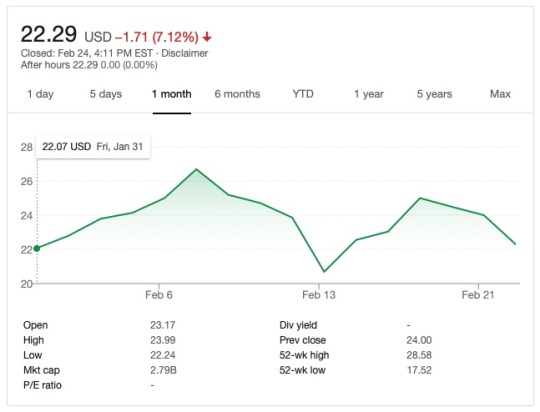
There are a ton of other primary care focused startups and companies that should not be overshadowed. Each takes on a slightly different approach, whether they focus on a specific population (e.g., Medicare Advantage), actually employ physicians themselves, or serve as administratively- and clinically-aligned vendors for networks of PCPs. I strongly believe in the value of these organizations using technology-driven communication, remote monitoring, home care, and intensive wrap-around care management services for complex populations to offer a new model of care.
If there was ever a downside for creating the primary care-led revolution towards value-based care, I believe it would be the production of charlatans claiming to “primary care consultants” or point-solutions that only affect a sliver of the problem. I see lots of claims related to SAAS startups who utilize an AI-based, machine learning analytics program that spits out a list of high-risk patients. After many years trying to squeeze clinical and financial value out of total-cost-of-care models, that is no longer enough. In my opinion, PCPs should seek partners who can not only provide technology, but also have clinical resources and are willing to stand by their performance in terms of compensation. No guaranteed PMPMs if performance doesn’t add measurable and definitive value, unless the organization is willing to take downside risk exposure. They also need to help your PCP organization understand how to set the rules of the game in your advantage. Otherwise, you will never win regardless of performance (e.g., trend rates, minimum savings thresholds, rebasing, shared savings, etc.).
Now I’m not claiming I know everything, but my experience was borne out of helping health systems and physician groups across the country manage total-cost-of-care contracts in Medicare fee-for-service (FFS), Medicare Advantage, Commercial, and Medicaid managed care while at Evolent Health. For those unaware, Evolent Care Partners is a solution focused on enabling independent PCPs with the capital and resources needed to participate and succeed within two-sided contracts. In addition to Evolent Health, there are a bunch of other primary care startups that I appreciate. They did not pay me (although I should’ve asked before), but here are a few startups that I would research before thinking about primary care in a value-based care world.
One Medical: Provider for Commercial
Iora Health: Provider for Medicare
Oak Street Health: Provider for Medicare
ChenMed: Provider for Medicare
Privia Health: Population health management partner for primary care
VillageMD: Population health management partner for primary care / provider
Aledade: Population health management partner for independent primary care
At the end of the day, primary care still receives a pitiful amount of the total spend in healthcare. The best estimates believe only 5-7% of healthcare spending devoted to primary care. In a RAND Corporation study, researchers predicted 2.12-4.88% of total Medicare fee-for-service medical and prescription drug spending. However, the power of referral, care management, and addressing the social determinants of health (e.g., housing, food, transportation, etc.) holds the promise of a better tomorrow. I am hopeful that the trends over the past few years will continue and new startups will be developed that further innovate on the $260 billion primary care market in the U.S..
Andy Mychkovsky is the creator of Healthcare Pizza, where this article first appeared.
The post Can Startups Save Primary Care? appeared first on The Health Care Blog.
Can Startups Save Primary Care? published first on https://wittooth.tumblr.com/
0 notes